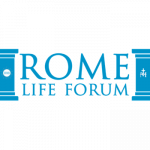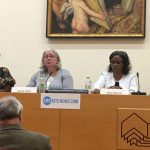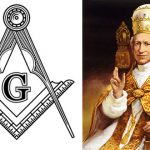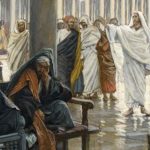16th January 2024
An Open Letter from Family Life International to Australia’s Catholic Bishops
Your Excellencies,
In a document dated 13 November 2023, the Dicastery for the Doctrine of the Faith has reaffirmed the incompatibility between Catholicism and Freemasonry and has reiterated the Church’s centuries-old prohibition on Catholics being members of Freemasonry.
Responding to a request for pastoral direction from the Most Rev. Julito Cortes, Bishop of Dumaguete, (Philippines) who expressed concern about the increasing numbers of his Catholic flock who were enrolled in Freemasonry, Cardinal Víctor Manuel Fernández, Prefect of the Dicastery for the Doctrine of the Faith, issued a “Note for the Audience With the Holy Father Regarding the Best Pastoral Approach to Membership in Freemasonry by the Catholic Faithful”1. The document was countersigned by Pope Francis. In addition to providing practical suggestions and pastoral guidelines, the document states that:
“ … active membership in Freemasonry by a member of the faithful is forbidden because of the irreconcilability between Catholic doctrine and Freemasonry (cf. Congregation for the Doctrine of the Faith, “Declaration on Masonic Associations” [1983], and the guidelines published by the Catholic Bishops Conference of the Philippines in 2003). Therefore, those who are formally and knowingly enrolled in Masonic Lodges and have embraced Masonic principles fall under the provisions in the above-mentioned Declaration. These measures also apply to any clericsenrolled in Freemasonry.”
The 1983 “Declaration on Masonic Associations” states:
“Therefore the Church’s negative judgment in regard to Masonic association remains unchanged since their principles have always been considered irreconcilable with the doctrine of the Church and therefore membership in them remains forbidden. The faithful who enrol in Masonic associations are in a state of grave sin and may not receive Holy Communion.”
Given this recent confirmation by the Apostolic See of the Church’s perennial ban on Catholic membership in Freemasonry, we feel it is an opportune moment to remind Your Excellencies of the ongoing deep concern among many Australian Catholics that was first sparked over six years ago by a letter of 11 July 2017 written by the then General Secretary of the Australian Catholic Bishops’ Conference, the Rev Stephen Hackett [see letter].
Fr. Hackett was replying to a letter sent a year earlier to the ACBC by Mr Stephen Michalak, a Catholic who was then Grand Master of Freemasonry for South Australia and the Northern Territory. In this letter, which he said was written with the unanimous support of all Masonic Grand Masters in Australia, Mr. Michalak not only asked the Australian bishops to “outline a pathway for Catholics who are Freemasons to full participation in the sacramental life of the Church,” but appealed to the present Holy Father’s pastoral approach in support of this request. To deny Catholic Masons access to the sacraments, said the Grand Master, “seems totally at variance to my understanding of what Pope Francis is actively trying to promote – a spirit of understanding and reconciliation . . . love and forgiveness”.
Rome’s recent reiteration of the Church’s absolute prohibition of membership in Freemasonry shows how completely Grand Master Michalak misunderstood the Holy Father’s thinking on this matter. But it seems possible that Fr. Hackett, along with the members of the Bishops’ Commissions on Canon Law and Doctrine and Morals whom he says he consulted, and not a few others among Your Excellencies, may have shared that misunderstanding. For Fr. Hackett’s response to the Grand Master, written on behalf of the ACBC, clearly leaves the door open to sacramental reception by Australian Catholic Freemasons in many or most cases, even though that door had been totally and firmly closed – and remains closed – by the Church’s perennial doctrine and discipline. Fr. Hackett’s response is particularly shocking to many of the faithful in this country, given that it claims merely to “reiterate” an Australian episcopal policy dating right back to 1984 that has been “affirmed this year” (i.e., some time between January and July 2017). As if to drive the point home, Fr. Hackett ends his letter to the representative of Australian Freemasonry by stating that this essentially affirmative response to his request is “the preferred approach of the Bishops [sic] Conference”.
So what, precisely, does this “preferred approach” consist in? Fr. Hackett assures Mr. Michalak that “no penalty attaches to Catholic membership in the Masonic order”. This is technically correct, given that in the 1983 Code of Canon Law the previous Code’s canonical penalty of excommunication for Masonic membership was deleted and replaced by a more general penal sanction against those who join any society that “plots against the Church” (cf. c. 1374). But since Fr. Hackett did not insert the word “canonical” before “penalty”, and since most lay Catholic readers would certainly regard their exclusion from the sacraments as a “penalty”, his statement is wide open to creating the false and scandalous impression that the Church no longer excludes Freemasons from the sacraments in any way.
It is true that Fr. Hackett nuances this seemingly permissive generalization by acknowledging that “in some other countries, . . . Freemasonry can be antithetical to Catholic faith” (in which case, presumably, membership would fall foul of canon 1374). So because of such regional or local divergences within Freemasonry, says Fr. Hackett, the Australian bishops have “prudently” decided not to issue any general directive on “Catholic involvement in Freemasonry”. Rather, he says, “such involvement is in each instance best addressed personally with the local parish priest”. Nevertheless, Fr. Hackett, claiming to express the official position of the ACBC, makes it abundantly clear that admission to the sacraments is to be the norm for Australian Catholic Freemasons, and exclusion from them the exception. For he tells the Grand Master that “where a local pastoral response is not consistent with this expectation [i.e., the expectation of admission to the sacraments as a general rule following the Church’s elimination of any “penalty” for Masonic membership] and liturgical-sacramental participation is made difficult or refused, that this might be referred to the local vicar-general or to me”.
In all this, however, Fr. Hackett’s letter ignores what seem to us two fundamentally important points. The first is that even when Freemasons do not “plot against the Church”, and so don’t incur the canonical penalty laid down in c. 1374, Masonic membership as such is still affirmed by the Church to be a grave sin that excludes from Holy Communion. Why? Because of “the irreconcilability between Catholic doctrine and Freemasonry”. Masonic communities do indeed allow members to profess and practice the religion of their choice, Christian or non-Christian; but only as one human tradition among others. Freemasonry’s relativistic, deistic and anti-supernatural ideology rejects the Catholic Church’s claim to possess uniquely the fullness of divine revelation. Moreover, Freemasonry has its own syncretistic religious rituals (which it tries to keep a closely guarded secret), and participation in prohibited rites such as these remains penalized in the current Code of Canon Law. In the section “Offences Against Religion and the Unity of the Church”, we read, “One who is guilty of participation in prohibited religious rites is to be punished with a just penalty” (c. 1365).
The second point Fr. Hackett ignores in his letter is the CDF’s insistence that local ecclesiastical authorities have no authority to mitigate or derogate from the Church’s total exclusion of Catholic Freemasons from the sacraments in places
where (as in Australia, apparently) they may discern a benign, rather than hostile, attitude towards the Church in local Masonic lodges. Indeed, Fr. Hackett’s message to this country’s Catholic Masons that the ACBC has in general opened the door to their liturgical and sacramental participation, and that exceptional or problematical cases may be referred to “the local parish priest”, the “local vicar general”, or Fr. Hackett himself, stands in open defiance of the 1983 Vatican ruling. For the Declaration ends with the following affirmation:
“It is not within the competence of local ecclesiastical authorities to give a judgment on the nature of Masonic associations which would imply a derogation from what has been decided above, and this in line with the Declaration of this Sacred Congregation issued on 17 February 1981. (cf. AAS 73 1981 pp. 240-241.)”
In view of the above, we respectfully request a new clarification from Your Excellencies regarding Catholic involvement in Freemasonry that includes a formal repudiation of Fr. Hackett’s erroneous position. More specifically:
1. We ask that the Australian Catholic Bishops Conference formally state its commitment to upholding the 1983 Declaration from the Congregation for the Doctrine of the Faith and the November 2023 Note from the Dicastery for the Doctrine of the Faith. Both of these are in continuity with the Church’s longheld judgment when they affirm, “The principles [of Freemasonry] have always been considered irreconcilable with the doctrine of the Church and therefore membership in them remains forbidden. The faithful who enrol in Masonic associations are in a state of grave sin and may not receive Holy Communion.”
2. We ask that the Bishops’ Commission for Canon Law and the Bishops’ Commission for Faith and Morals, both explicitly mentioned by Fr Hackett as having been consulted prior to the release of his letter, clarify for those unfamiliar with canon law that the statement “no penalty attaches to Catholic membership in the Masonic order” refers only to the absence of an ecclesiastically imposed canonical punishment such as excommunication or interdict, and in no way implies that such membership is morally acceptable.
3. We ask that, in a manner similar to that which has now been recommended to the Filipino Bishops by the DDF, the Australian Bishops “conduct catechesis accessible to the people and in all parishes regarding the reasons for the irreconcilability between the Catholic Faith and Freemasonry”.
4. We ask that the results of any investigation into the preparation and publishing of Fr. Stephen Hackett’s 2017 letter be made public. For that letter, written on behalf of the ACBC, directly contradicts the well-known doctrine and discipline of the Catholic Church towards Freemasonry that had been declared in 1983 by the CDF under Pope St. John Paul II and has now been reaffirmed by the DDF under Pope Francis.
These requests to Your Excellencies are being respectfully made in the spirit of canon 212, sections 2 and 3, which recognize the right of Christ’s faithful to make known to the Pastors of the Church their spiritual needs and their views on matters which concern the good of the Church. We present them with a view to mitigating the scandal experienced in this matter by the faithful, as well as by members of Freemasonry, whose immortal souls may have been put in jeopardy by rash assurances that such membership is not sinful and is compatible with the reception of the Eucharist.
Be assured of our prayers for Your Excellencies as we thank you for your gracious attention to this submission,
Yours sincerely in Christ,
Paul Hanrahan, Executive Director. 21 December 2023
Michael Brearley, Chairman of the Board. 21 December 2023
Kathy Clubb, Director. 21 December 2023









